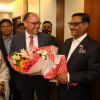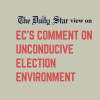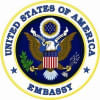Delving into the new US visa policy for Bangladesh

Bangladesh recently witnessed a rare turn of events in its political history: the ruling Awami League and the main opposition BNP both welcomed a US decision to impose visa restrictions on a wide range of officials and their families in the country in the event of election-related breaches. Although their reasons are different, both parties welcoming the move is quite embarrassing for the nation because, after all, it is the political parties that are responsible for this humiliating measure.
To begin with, it is completely up to the discretion of the United States government to determine whom it will allow into the country and whom it will not. Many people are denied US visa every day. But visa restrictions, as a policy, matter, because this policy applies to people who are found to be involved in or responsible for thwarting or impeding the democratic process and/or elections in Bangladesh. Their family members, too, will be denied US visa as a consequence.
Its geopolitical interests aside, the US has always stressed that democracy must be at the core of Bangladesh's politics. After the last two national elections, people seem to have little interest in the upcoming general elections, with many saying publicly that it would be just for show.
Seeing the ruling Awami League welcome the latest US move, one may wonder if they, too, implicitly admit that the measure is justified because democracy is actually being undermined in Bangladesh. Although the ruling party claims that the visa ban is, in fact, aimed at the opposition, a close examination reveals that it is largely targeted at the ruling party and the government machinery. Surely, the BNP cannot avoid the responsibility either, since they, too, have a crucial role to play in upholding democracy in Bangladesh.
What is further significant is the timing of the US visa policy. BBC Bangla reports that Bangladesh is the fourth country to face such visa restrictions in recent years. The three other countries are Nigeria, Uganda and Somalia, where visa restrictions were imposed after the elections. For Bangladesh, however, the restrictions have come almost seven months before the national elections are scheduled to take place.
This preemptive action seems to be a warning. It can also be interpreted as a precursor of something more to come. On the flip side, the preemptive measure also allows the Awami League to address the issue and explore what might assuage the US. At the same time, this measure also takes the air out of BNP's threat to boycott the elections if not held under a neutral caretaker government.
In his question-answer session on May 24, US Department of State spokesperson Matthew Miller said it was a signal from the US. "…I think it is a signal by our part that we support free, fair, and peaceful elections in Bangladesh, and we have the ability to hold anyone accountable who hinders the – any free, fair election in the country. And it's – it is a signal… it is a signal to all members of society, as I mentioned – military security forces, members of judiciary – that we have this ability and that we are paying attention."
But there has been no mention of a name. Then how would people know that they have been put on the "no visa" list? Also, how would these restrictions be imposed? Who will monitor infringement and how will the entire exercise be carried out? For instance, how is the US going to receive complaints or allegations? Can Bangladeshis lodge complaints if they feel they have been wronged? There appears to be much that is still unspecified.
On another note, while it is still unclear whether these restrictions are more serious than the sanctions earlier imposed on the Rapid Action Battalion (Rab), there is no doubt that the impact of the new visa policy is substantially more far-reaching. It is also clear that the US made this decision after careful consideration. If it imposed sanctions on certain individuals or institutions, there would be scope for criticising it. But that is not the case here. Some commentators have likened it to the age-old police tactic where they file cases against "unknown persons" just to be able to implicate or harass certain groups of people later. The visa restrictions, they say mockingly, are like those "ghost cases."
It is interesting to note that the restrictions target a section of society that covets the US visa. They want to send their children to schools and universities in the US. Some have amassed wealth and assets in the US and must have a plan to get there sometime to enjoy their fortune. In other words, the political, administrative, judicial, and social leaderships that run our country and determine our policies have sadly forsaken the future of Bangladeshis in favour of their own selfish interests – like ensuring a better future for themselves in foreign countries like the US. Now that it could be under threat, would they be willing to risk all of that just to favour one side over the other in the elections?
Mohammad Al-Masum Molla is chief reporter at The Daily Star.

 For all latest news, follow The Daily Star's Google News channel.
For all latest news, follow The Daily Star's Google News channel. 










Comments